The Chilling Adventures of Sabrina‘s Non-Binary Character Deserves Better
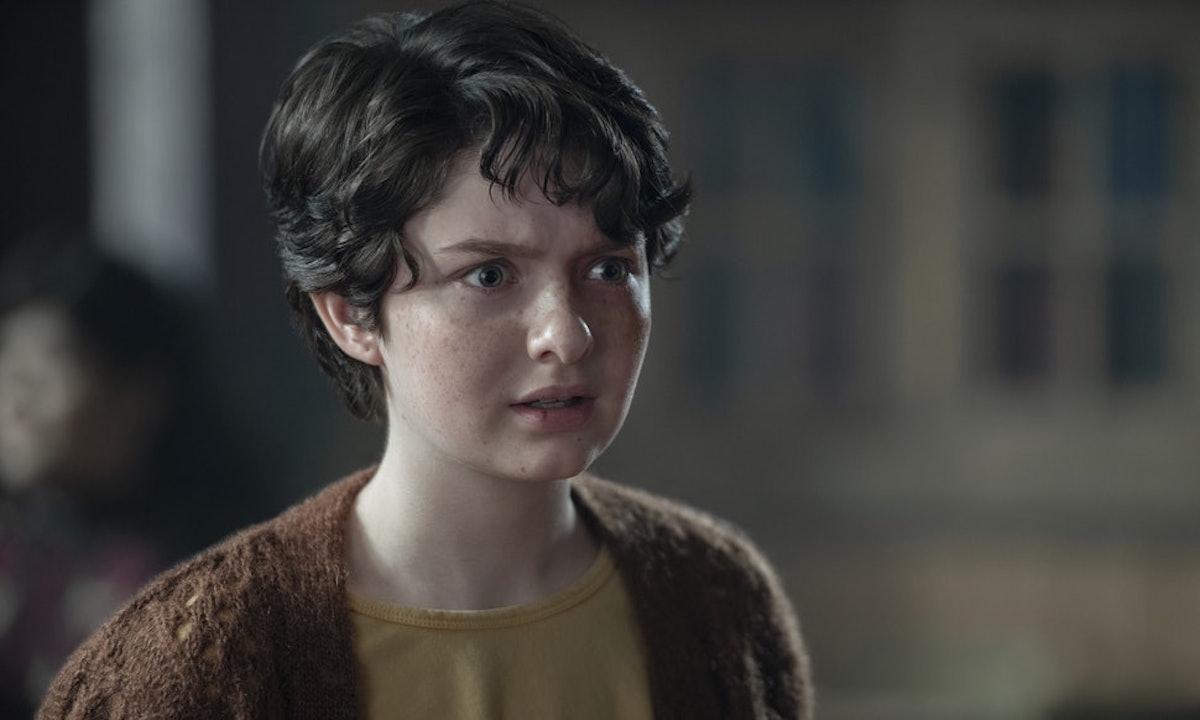

***Spoilers for Chilling Adventures of Sabrina***
For the most part, I enjoyed Netflix’s Chilling Adventures of Sabrina. The show may not involve much heavy intellectual lifting, but it succeeds in being compellingly watchable. There are some considerable missteps, however: the way Sabrina talks about queerness and queer characters feels shockingly old-fashioned and outdated. Most glaringly, it doesn’t seem to know what to do with Susie, the show’s non-binary character.
Chilling Adventures of Sabrina tries hard to be a progressive, hip-with-the-times show, and on the surface, it doesn’t do a poor job. Nary an episode goes by without an uber-feminist message about empowered women and commentary on the faults and cruelties of men. This is a property that was quite clearly forged in the shadow of #MeToo, and it’s hard not to nod whenever some witch or another sighs, “Men.” The cast is a good deal more diverse than many teen dramas of the past and present, though there are also problematic elements in its depiction of characters of color.
For all of these attempts at progressiveness, I was frustrated and somewhat confounded by the show’s treatment of queerness from the getgo. Early on, Sabrina and the Weird Sisters take revenge on bullying football players by causing the unclothed boys to think they’re kissing girls when they’re actually bewitched into making out with each other. Sabrina then photographs the scene and uses the apparent unbearable shame these pictures would cause to keep the young men in line.
This is a gross set-up that seems more like a homophobic gag from an ’80s movie than something made for an in-the-know 2018 audience, as our Princess Weekes noted in her review of the show. Not to mention that the boys needed to be punished in the first place for their cruel treatment of Sabrina’s non-binary friend Susie Putnam, including physically assaulting Susie to try and see their chest under their androgynous outfit. (I’m using they/them/their pronouns for Susie, as these have not been specified on the show, but are what the actor portraying Susie prefers.)

From the show’s start, Susie’s non-binary nature is treated as a thing that sets them up as a misunderstood outsider at school and at home, a further disappointment to those of us who were thrilled to see the inclusion of such a character—played by non-binary actor Lachlan Watson—in the first place. (Watson is excellent in the role, and deserves no guff for how Greendale’s residents are written to react to Susie.) Would it have been so hard to make Susie a less-than-socially-miserable student—much like their popular BFF Sabrina?
Susie could still wrestle with confusion about their identity, as most teenagers do, but this is 2018: the seeming expectation from peers that Susie dress in a performatively feminine way or else face violent harassment (that the school authorities will do nothing about) seems straight out of the ’50s. Susie is loved without question by their best friends, which is great, but the greater world of Greendale seems trapped in the past.
And to be fair, it sort of is? This is a town where people dress in a decidedly throwback fashion, call each other on house phone lines, and utilize card catalogs in the library. Yet, as CBR illuminates, its residents are also aware of modern horror movies, Fiona Apple, and Sabrina’s boyfriend Harvey has a smartphone. They can’t have their retro cake and eat the trappings of modern society too.
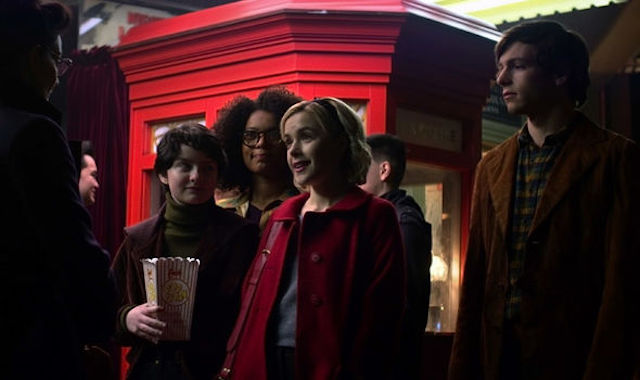
Are we meant to believe that no one in Greendale knows about non-binary gender identification? The word “non-binary” is never uttered, and Susie is often misgendered. Does no one except Harvey Kinkle have access to the Internet?
Unfortunately, the incidents with the football players are only the beginning of otherness and queerness being addressed as something shameful on Sabrina, or to use the show’s antiquated, terrible phrasing on the matter, abominable. And this tends to crop up most around Susie.
In the episode “An Exorcism in Greendale,” it becomes clear that Susie’s disturbed Uncle Jesse is actually possessed by a demon, Apophis. Upon questioning, Apophis tells Sabrina that he was able to possess Jesse in the first place because the man is an “abomination.” Of what sort? As Apophis quickly clarifies, Jesse is a “sodomite.”
A sodomitical abomination? I haven’t heard such horrific terminology used in regards to queer characters on modern television, ever, no matter the time period their stories are set or how torturously they are wrestling with their sexuality. (It’s also curious to me that this kind of Judeo-Christian biblical language on the nature of “sin” is coming out of the mouth of a demon modeled on an ancient Egyptian chaotic snake deity, but okay.) Apophis is an evil demon—the audience surely isn’t meant to agree with him.
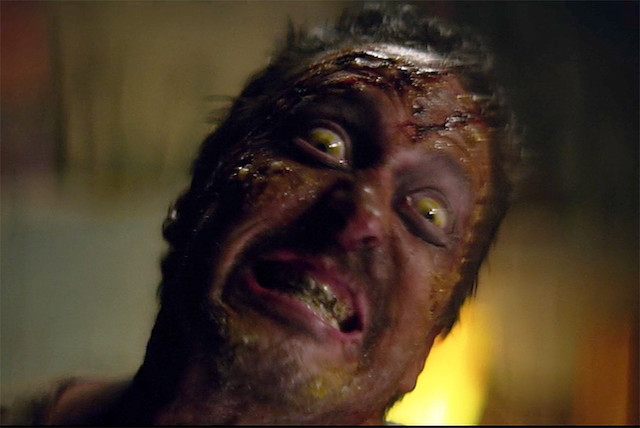
But words have power, as Sabrina frequently reminds through its use of naming names and spells, and to hear these words in conjunction with queer characters is jarring. Especially on a TV program with a recommended 14-and-up age rating. This classification of Jesse—a abomination because he is queer—is also not refuted after it is voiced, which would be an important part of countering such hateful rhetoric, if that was indeed the point.
Instead, as Susie’s father explains, we learn that Jesse was never understood by his family for his cross-dressing tendencies as a child and his sexuality. It’s another cold and othering and much-dated aside about a man born in the 1980s, not the 1780s, stated while the family is considering shipping Jesse off to an asylum. Susie overhears this discussion about Jesse and is extremely upset by it. Susie’s father also speaks about queerness as a “personal demon.”
Sabrina eventually succeeds in casting Apophis out of the hapless Jesse, but after coming through that ordeal, he’s murdered for no apparent reason by Ms. Wardwell. What, exactly, was the lesson of Uncle Jesse save that his sexual orientation led him to be exploitable by an evil entity, rendered violently ill, and now he’s dead without consequence?
Apophis, when in Jesse’s body, also calls Susie an “abomination,” and tauntingly refers to Susie as a “boy-girl” more than once. Really? Really? The result of this is that Susie ends the episode wearing dresses for the first time in Sabrina’s experience, terrified that they are as the demon named them: an abomination. Really?
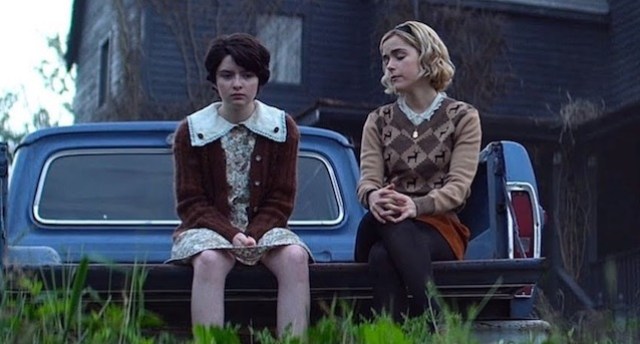
In later episodes, Susie becomes obsessed with the Putmans’ pioneer ancestor Dorothea, a woman who proudly wore men’s clothing and defied social conventions. Susie’s idealization of Dorothea—soon coupled with their seeming ability to see and talk with Dorothea’s spirit—helps give Susie more confidence; in an apparent bid to learn more about gender beyond the binary and cisnormativity, they try to steal Virginia Woolf’s Orlando from the town bookstore. (In Orlando, the long-living protagonist “changes sex” throughout the centuries.)
Yet Susie’s contact with Dorothea is a supernatural element on the show that hasn’t been explained, and on future seasons of Sabrina, I wouldn’t be surprised if it was an indication of more sinister designs. “Dorothea” seems to be helping Susie now, but Dorothea’s also a mysterious and unexplained figure who encourages Susie to do things like venture into a collapsing mine. It makes me uncomfortable to consider that Susie’s now primary queer support system is a ghost who may not have their best interests at heart.
Beyond the troubling language and situations that repeatedly revolve around queer characters on Sabrina—don’t even get me started on how Sabrina’s pansexual cousin Ambrose is in a relationship with a warlock, Luke, because Aunt Hilda dosed Luke with a love potion, thus eliminating his consent—Susie’s representation so far feels disappointing because it feels like such a missed opportunity.
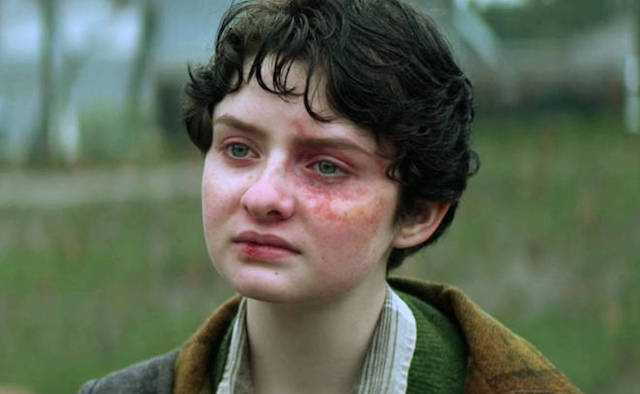
At last, a non-binary character on a high-profile show, played by a non-binary actor, and Susie primarily experiences fear, pain, and confusion from their identity. I would have preferred a thousand saccharine “the more you know” educational moments about non-binary people rather than this representation of them as so lacking resources that the spirit world is the only hope of relief.
If Susie’s torturous journey had to be the case, then Sabrina should have also spent more time on what it meant and talked about it openly. Instead, it has played out as an (underdeveloped) side storyline more appropriate to the time period when the original Sabrina comics came out, the ’60s—but as we’ve discussed, Harvey Kinkle has a smartphone.
In a recent interview with Bustle, actor Lachlan Watson spoke about their own journey of gender identity and the importance of playing Susie. While I believe that the show’s creatives have their hearts in the right place, and Watson speaks warmly about the experience, parts of the interview feel illuminating and may explain why, at times, it seems like the show doesn’t know what it’s doing in regards to Susie.
In the original Sabrina script, per the Bustle article, “Susie identified as a transgender man and came out in the first few episodes of the Netflix series, but Watson … was concerned that was too soon.”
“I may have influenced the writers to hold off,” Watson admits over the phone of Susie’s coming out. “I talk so much about myself and my identity as a non-binary person and I think they listened, and if anything it helped them understand that labels aren’t everything. Susie is on an ongoing queer journey, just like myself.”
It’s great that Watson spoke up and impacted the initial development for Susie, and that Roberto Aguirre-Sacasa, who developed the show, was receptive. (Aguirre-Sacasa, who is also the Chief Creative Officer for Archie Comics and Riverdale’s showrunner, is openly gay, as is Sabrina executive producer Greg Berlanti, though their shows have been the subject of questions about queer representation before.)
Watson’s intervention in Susie’s case suggests that Sabrina‘s creatives might not have actually planned for an ongoing non-binary teenage representation, nor did they seem to understand much about it when they first developed Susie. While it’s important that Susie not be pinned down by labels and strict definitions, as Watson points out, the way Susie seems to exist in a town that doesn’t know any words to use for them feels unrealistic.
I guess I’m most disappointed that the show decided to locate so much of Susie’s journey in trauma. Susie’s actor did not experience this:
“I mean I dealt with my fair share of inner bullies, but having it be physically manifested is traumatic and it’s incredibly stressful,” they say. “It’s really opened my eyes to what a struggle it is to be queer every day and literally come out of your house every morning.”
I can’t help but feel that rather than repeat the age-old stereotypes that queerness and otherness equate with bullying, violence, and familial difficulties, a truly revolutionary move to make with Susie would have been to make them unapologetically well-researched, proudly outspoken, and fully embraced by their community. Many teenagers I’ve encountered these days know as much, or more, about gender identity than my “women’s and gender studies” professors did in college fifteen years ago. Let’s start telling new kinds of stories about queer and gender-non-conforming characters.
“Just telling that story has meant a lot to me. I think it would have meant a lot to little young confused me, too,” Watson told Bustle. What I wish is that young confused kids could have turned on the Chilling Adventures of Sabrina and seen a non-binary character who wasn’t tormented. What I wish is that I never have to hear the word “abomination” or see smirks and shaming in regard to queerness on this show ever again.
“A lot of Susie’s gender journey comes to light in season 2,” Watson told Refinery29. “There’s a lot of intricacies we’re having a whole bunch of fun with here.” For the love of Madam Satan, please let Susie actually have some fun.
(image: Netflix)
Want more stories like this? Become a subscriber and support the site!
—The Mary Sue has a strict comment policy that forbids, but is not limited to, personal insults toward anyone, hate speech, and trolling.—
Have a tip we should know? [email protected]
